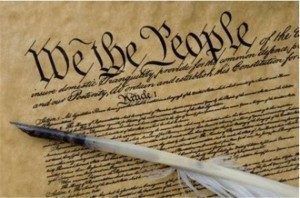By: Kyle Maichle and S.T. Karnick
As is clear from the rise of Donald Trump, Ben Carson, and Carly Fiorina in the Republican presidential primaries and the groundswell of support for socialist Bernie Sanders among Democrats, a large portion of the American public has become fed up with the national government’s apparent takeover by powerful special-interest groups. Each new day brings another story of bad legislation and worse court decisions giving certain classes of people advantages denied to the rest of the people.
Partisan gridlock and the battles between various interest groups have made it impossible to roll back ill-conceived government policies. Gridlock, however, is partly a product of elements of the Constitution the nation’s founders considered essential. James Madison, the fourth president of the United States and widely considered to be the “Father of the Constitution,” was well aware of the potential for gridlock, and he saw it as a positive thing.
Writing in Federalist No. 62 about equality of representation in the Senate, Madison noted, “As the facility and excess of law-making seem to be the diseases to which our governments are most liable, it is not impossible that this part of the Constitution may be more convenient in practice than it appears to many in contemplation.” The policy is good, he observed, because it makes it more difficult for the national government to act.
Elaborating on that thought, Madison wrote, “It is a misfortune incident to republican government, though in a less degree than to other governments, that those who administer it may forget their obligations to their constituents, and prove unfaithful to their important trust. In this point of view, a senate, as a second branch of the legislative assembly, distinct from, and dividing the power with, a first, must be in all cases a salutary check on the government. It doubles the security to the people, by requiring the concurrence of two distinct bodies in schemes of usurpation or perfidy, where the ambition or corruption of one would otherwise be sufficient.”
The fundamental beauty of the U.S. Constitution is that it essentially gave everybody veto power over the actions of the national government. Nothing could become the law of the land unless both houses of Congress, the president, the Supreme Court, and the states all agreed that it should be. Any action of the national government had to run a long gantlet in order to become law.
As is clear from the rise of Donald Trump, Ben Carson, and Carly Fiorina in the Republican presidential primaries and the groundswell of support for socialist Bernie Sanders among Democrats, a large portion of the American public has become fed up with the national government’s apparent takeover by powerful special-interest groups. Each new day brings another story of bad legislation and worse court decisions giving certain classes of people advantages denied to the rest of the people.
Partisan gridlock and the battles between various interest groups have made it impossible to roll back ill-conceived government policies. Gridlock, however, is partly a product of elements of the Constitution the nation’s founders considered essential. James Madison, the fourth president of the United States and widely considered to be the “Father of the Constitution,” was well aware of the potential for gridlock, and he saw it as a positive thing.
Writing in Federalist No. 62 about equality of representation in the Senate, Madison noted, “As the facility and excess of law-making seem to be the diseases to which our governments are most liable, it is not impossible that this part of the Constitution may be more convenient in practice than it appears to many in contemplation.” The policy is good, he observed, because it makes it more difficult for the national government to act.
Elaborating on that thought, Madison wrote, “It is a misfortune incident to republican government, though in a less degree than to other governments, that those who administer it may forget their obligations to their constituents, and prove unfaithful to their important trust. In this point of view, a senate, as a second branch of the legislative assembly, distinct from, and dividing the power with, a first, must be in all cases a salutary check on the government. It doubles the security to the people, by requiring the concurrence of two distinct bodies in schemes of usurpation or perfidy, where the ambition or corruption of one would otherwise be sufficient.”
The fundamental beauty of the U.S. Constitution is that it essentially gave everybody veto power over the actions of the national government. Nothing could become the law of the land unless both houses of Congress, the president, the Supreme Court, and the states all agreed that it should be. Any action of the national government had to run a long gantlet in order to become law.





